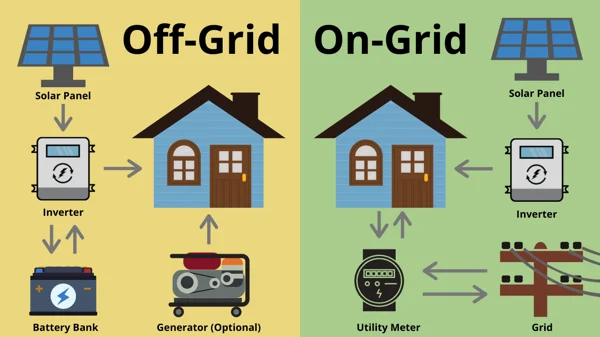
Solar energy is indeed one of the greatest sustainable sources for producing large amounts of power at a low cost. India emerged as a leader in solar power generation, showcasing its commitment to renewable energy. The Indian government has been proactive in launching initiatives to develop more solar plants and expand capacity across the country. If you want to be part of this historic transition to a greener future, now is the perfect time to adopt solar technology for your home or office. Installing solar panels not only helps reduce your energy bills but also contributes to a cleaner environment, making a positive impact on both your community and the planet. Join the solar revolution and embrace the benefits of renewable energy!
Types of Solar Power Systems for Homes in India
There are two primary types of solar power systems suitable for residential buildings and offices in India:

- On-Grid Solar Power System: On-Grid solar systems are connected directly to the local power grid. They allow homeowners to generate electricity from solar panels while still drawing power from the grid when needed. The system monitors energy consumption and solar generation, resulting in a net metering system where your electricity bill reflects the difference between the energy consumed from the grid and the energy produced by your solar panels. This setup is particularly advantageous in urban areas where electricity usage is high. However, it relies on grid availability; during power cuts, the system will not function, making it less reliable in areas with frequent outages.
- Off-Grid Solar Power System: Off-Grid solar systems operate independently of the power grid. They store energy generated by solar panels in batteries, which can then be converted to AC power for household use. This type of system is ideal for areas experiencing frequent power cuts or lacking reliable electricity sources. The demand for off-grid systems is growing, especially in rural and some urban regions, due to their low maintenance costs and ability to provide a consistent power supply despite outages.
Three things to check before buying solar panels
By focusing on these key factors—efficiency, warranty, and quality—you can make an informed decision when selecting solar panels for your home, ultimately leading to a more sustainable and cost-effective energy solution.
Efficiency: Efficiency refers to the amount of sunlight converted into usable solar energy. Look for solar panels with an efficiency rating between 16% and 18%, as this is the industry standard.
Manufacturer’s Warranty: Solar systems are a long-term investment, so it’s crucial to consider the warranty offered by the manufacturer. A good warranty period typically ranges from 10 to 25 years.
Quality and Durability: When selecting solar panels, check for certifications and reviews to gauge their reliability. Panels made from high-quality materials are more resistant to environmental factors such as hail, snow, and extreme temperatures, ensuring they last longer and perform better over time.
Here are 5 Best Solar Panel for Home in India
1.Tata Power Solar Panels
- Type: Monocrystalline/Polycrystalline
- Efficiency: Up to 20%
- Warranty: 25 years
2.Adani Solar Panels
- Type: Monocrystalline
- Efficiency: 18-21%
- Warranty: 25 years
3.Vikram Solar Panels
- Type: Monocrystalline/Bifacial
- Efficiency: Up to 20%
- Warranty: 25 years
4.Luminous Solar Panels
- Type: Polycrystalline
- Efficiency: 16-18%
- Warranty: 25 years
5.JA Solar Panels
- Type: Monocrystalline/Half-Cut
- Efficiency: Up to 22%
- Warranty: 12-25 years
Make sure to consult with local suppliers and installers to find the best fit for your specific energy needs and roof conditions!
Average Energy Consumption in Indian Houses
- Small Family (1-3 members):
- Average Monthly Consumption: 100-300 kWh
- Daily Consumption: 3-10 kWh
- Medium Family (4-6 members):
- Average Monthly Consumption: 300-600 kWh
- Daily Consumption: 10-20 kWh
- Large Family (7+ members):
- Average Monthly Consumption: 600-1,200 kWh
- Daily Consumption: 20-40 kWh
Typical Appliance Consumption (for reference)
- LED Bulb (10W): 0.05 kWh per hour
- Ceiling Fan (70W): 0.56 kWh per 8 hours
- Refrigerator (200W): 4.8 kWh per day
- Air Conditioner (1.5T): 9 kWh per day (6 hours of use)
- Television (50W): 0.2 kWh per 4 hours
- Washing Machine (500W): 0.5 kWh per load
These averages provide a baseline for understanding typical energy needs in Indian households, helping you gauge your potential solar power requirements!

Subsidy Structure is Below









Leave a Reply